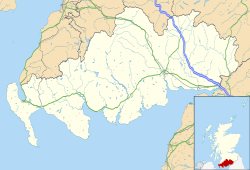| Gretna | |
|---|---|
 Central Avenue, Gretna | |
Location within Dumfries and Galloway | |
| Population | 3,110 (2020) [1] |
| OS grid reference | NY320671 |
| Council area | |
| Lieutenancy area | |
| Country | Scotland |
| Sovereign state | United Kingdom |
| Post town | GRETNA |
| Postcode district | DG16 |
| Dialling code | 01461 |
| Police | Scotland |
| Fire | Scottish |
| Ambulance | Scottish |
| UK Parliament | |
| Scottish Parliament | |
Gretna is a new town in Dumfries and Galloway, Scotland, originally part of the historic county of Dumfriesshire. [2] It is located close to the A74(M) on the border of Scotland and England and near the mouth of the River Esk. [3] Gretna was built from 1915 [4] and is about 1km south of the older village Gretna Green.
Contents
- History
- World War I
- Transport
- Rail
- Roads
- Sport
- Gretna Green
- Shopping
- Media
- Television
- Radio
- Newspapers
- References
- Notes
- Sources
- External links
The town is situated 22 mi (35 km) east-south-east of Dumfries, 8 mi (13 km) east of Annan, 10 mi (16 km) north-west of Carlisle, 88 mi (142 km) south-east of Glasgow and 89.5 mi (144 km) south of Edinburgh.

